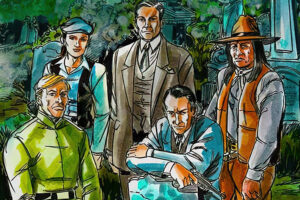 I’ve posted in the past of thrillers by several modern authors. I feel that many of these have pulpish elements, and have enjoyed several of them. Another that I have been reading is the Cotton Malone series by Steve Berry. While Berry wrote a few standalone works, he created Cotton Malone in 2006 and has put out over a dozen on an annual basis, with another on its way. I’ve only read a handful so far.
I’ve posted in the past of thrillers by several modern authors. I feel that many of these have pulpish elements, and have enjoyed several of them. Another that I have been reading is the Cotton Malone series by Steve Berry. While Berry wrote a few standalone works, he created Cotton Malone in 2006 and has put out over a dozen on an annual basis, with another on its way. I’ve only read a handful so far.
I call these “historical thrillers,” though they aren’t set in the past, but make heavy use of historical events to build the story, usually with an element of some secret society or organization involved in some way, as well as a revelation of previously unknown history. There is an element of the fantastical in what may have happened in the past. There are a lot of historical facts in these works, and this is laid out in the end of the books.
Cotton Malone is a former agent of the U.S. Department of Justice. He had worked for a fictional group called the “Magellan Billet,” which dealt with international matters. This was after a period as a naval pilot then JAG lawyer.
Divorced, with a son (who doesn’t live with him), Malone has instead moved to Denmark to run a bookstore. But he often gets pulled into matters, often working with his former boss, sometimes doing work for the federal government (sometimes at the request of the President). He is often assisted by Cassiopeia Witt, who seems to be a possible love interest.
Again, as with other series, while each book stands alone, personal matters with the characters do carry over from book to book. In the earlier books, Henrik Thorvaldsen, who is a friend of Malone as well as a Danish millionaire, often was involved. Cotton’s son gets pulled into things in one work. The relationship between Witt and Cotton develops over the course of several books. And secondary characters will appear in several books. And some secondary characters do die.
 So far the series consists of the following:
So far the series consists of the following:
- The Templar Legacy, 2006
- The Alexandria Link, 2007
- The Venetian Betrayal, 2007
- The Charlemagne Pursuit, 2008
- The Paris Vendetta, 2009
- The Emperor’s Tomb, 2010
- The Jefferson Key, 2011
- The King’s Deception, 2013
- The Lincoln Myth, 2014
- The Patriot Threat, 2015
- The 14th Colony, 2016
- The Lost Order, 2017
- The Bishop’s Pawn, 2018
- The Malta Exchange, coming in 2019
As I noted, each novel is built off of some historical matter. While I haven’t read them all, here are some of the plots:
The Venetian Betrayal has a dangerous Central Asian leader after the tomb of Alexander the Great, and its secrets. There is a secretive “Venetian League” involved, and this leader had united the various “ ’Stans” into a single nation and plans on unleashing biological weapons on her enemies to expand this nation. There is also a previous unknown “draft” that may be a unknown cure for various ills.
The Emperor’s Tomb deals with the a power struggle within China between the second and third vice premiers. A conspiracy of Chinese eunuchs, who still exist, is involved, that also ties to the first Emperor’s Tomb (the one with the terra cotta warriors), and the possibility that oil is in unlimited quantities.
The Jefferson Key has Cotton discover a secret society of pirates that has existed from the beginning of the United States, which had been tasked with protecting the country. But feeling misused, they attempt to assassinate the president. So Cotton needs to figure out what has authorized this group, expose them, and put an end to their threat.
I’ve enjoyed all the novels so far, and am working on two more. While I prefer stories with high tech ideas, as I also love history, the historical stuff with just an element of the fantastical, also appeals to me. Maybe it will appeal to others.




Your comments